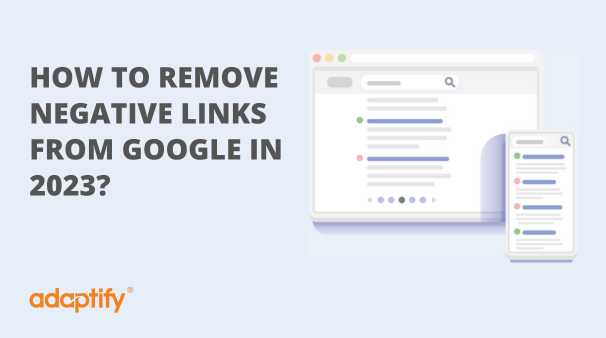Negative links can severely damage a brand’s reputation. When potential customers or partners search for information about a brand, encountering negative content can create doubts and erode trust. It may dissuade them from engaging with the brand, leading to lost opportunities and revenue.
Negative links can deter potential customers from purchasing or seeking brand services. One negative review or article with a high ranking in search results can disproportionately impact a brand’s perception, potentially resulting in lost business opportunities.
Negative content can spread quickly on social media and other online platforms, amplifying its reach and impact. Even a single negative link that goes viral can cause significant damage to a brand’s reputation and be challenging to contain or control.
Negative links can affect a brand’s image. Once published online, negative content may resurface in search results, haunting the brand’s reputation for years.
Brands in competitive markets face an additional risk of competitors actively promoting negative content to gain a competitive advantage. Negative links created or promoted by rivals can further damage a brand’s reputation and market standing.
Negative links can affect a brand’s search engine optimisation efforts. Search engines tend to prioritise relevant and popular content, including negative ones, if they gain traction. This can lead to the suppression of positive content, making it more challenging for the brand to promote its desired image.
Negative links and online criticism can also impact employee morale. Employees may feel discouraged or demotivated when their employer’s brand is portrayed negatively in public forums.
This blog will explore effective strategies to remove negative links from Google in 2023 and safeguard your online reputation with expert guidance.
When dealing with negative content about your brand for online reputation management (ORM) purposes, the first crucial step is to reach out directly to the website or publication responsible for hosting the content. Throughout this process, it is essential to maintain a calm and professional demeanour, even though negative content may evoke emotional reactions. Responding with composure will prevent further harm to your reputation.
Start by identifying the harmful content you wish to address, including articles, blog posts, social media mentions, reviews, or any other material that reflects poorly on your brand. Gather all relevant information, such as URLs and publication dates, along with any supporting evidence highlighting the inaccuracies or potential harm caused by the content.
Next, locate the contact information of the website or publication where the harmful content is hosted. Look for a “Contact Us” page, email addresses, or other contact details on their website. Once you have the necessary information, compose a thoughtful and concise email directed to the website’s editor, administrator, or support team, explaining the purpose of your message.
In the email, clearly express that you represent the brand in question and have discovered negative content related to your brand on their platform. Be specific about the content by providing URLs and dates for easy reference. Articulate your concerns about how the negative content is impacting your brand’s reputation, highlighting any factual inaccuracies, misleading information, or outdated content that may be present.
When requesting the removal of negative content or amendments to address your concerns, make sure to do so kindly and courteously. Avoid using aggressive language or making demands, and instead focus on seeking their understanding and cooperation. If there are factual errors in the content, request them to be corrected.
After sending the initial email, be patient and wait for a response. If you are still waiting to receive one within a reasonable time, consider following up with another email or exploring alternative communication channels, such as reaching out through social media or customer support.
Remember that online reputation management is ongoing, and not all websites or publications may be willing to remove negative content. In such cases, consider other ORM strategies, like creating and promoting positive content about your brand, to push down negative search results.
Creating and promoting positive content across various online platforms can push down negative search results and influence how people perceive you or your brand online. Here’s a detailed guide on how to achieve this:
Start by defining your ORM goals. Determine what type of positive image you want to project and the specific aspects you wish to promote. This could include highlighting your accomplishments, positive reviews, testimonials, community involvement, or any other positive attributes relevant to your brand.
Utilise search engine optimisation (SEO) techniques to ensure that your positive content ranks well in search engine results. This involves using relevant keywords, optimising meta tags, and obtaining backlinks from authoritative and credible websites. Focus on creating content that answers commonly searched questions related to your brand.
Facebook, Twitter, LinkedIn, Instagram, and YouTube are powerful tools for ORM. Create and regularly update profiles on major social media channels and engage with your audience, respond to comments, and share your positive content across these platforms.
Write guest posts for reputable websites and blogs within your industry. By providing valuable content to these sites, you can gain exposure to new audiences and secure backlinks to your positive content. Additionally, consider content syndication platforms to share your articles and blog posts widely.
Encourage satisfied customers or clients to leave positive reviews and testimonials on relevant review sites, such as Google My Business and industry-specific platforms. Positive reviews not only help with ORM but also contribute to building trust with potential customers.
Engaging a professional for online reputation management (ORM) can be an innovative and practical approach to removing negative links and improving your brand’s online image. Many agencies have the expertise, experience, and resources to handle complex reputation issues and implement strategies that yield positive results. Here’s a detailed overview of how a professional can help you with removing negative links for ORM:
A reputable ORM professional will begin by thoroughly assessing your brand’s online reputation. They will identify negative links, evaluate their impact on your brand, and analyse the overall sentiment surrounding your online presence. This assessment allows them to develop a tailored strategy to address specific issues and achieve their ORM goals.
ORM professionals are skilled at approaching website administrators, publishers, or search engines to request the removal of negative content that violates guidelines or laws. They can use established channels and contacts to make formal removal requests and persuade sites to remove harmful content when appropriate. Additionally, they may employ suppression tactics by pushing down negative links in search engine rankings using SEO strategies and positive content promotion.
In cases where the negative content is defamatory, false, or illegal, ORM professionals may work closely with legal experts to explore potential legal avenues. They can assist with cease-and-desist letters, DMCA takedown requests, or legal actions to address more challenging reputation issues.
Professionals in the field are adept at managing online reviews and testimonials. They can develop a system to encourage positive reviews from satisfied customers and handle negative reviews diplomatically, turning potential detractors into brand advocates.
A significant aspect of ORM involves promoting positive content that reflects your brand in a favourable light. ORM professionals can create high-quality content like blogs, articles, press releases, and social media updates that showcase your brand’s strengths and values. They use SEO techniques and content distribution strategies to increase the visibility of positive content and suppress negative links in search results.
Professionals can handle social media profiles, monitor conversations, engage with followers, and respond to comments and messages in a timely and professional manner. Effective social media management can prevent negative content from going viral and help build a positive online reputation.
In a reputation crisis, ORM professionals are well-equipped to implement crisis management strategies. They can address the situation promptly, communicate transparently with stakeholders, and work towards repairing any damage to your brand’s reputation.
ORM professionals continuously monitor your brand’s online presence, tracking changes in search rankings, social media mentions, and sentiment. They provide regular reports and updates, keeping you informed of progress and any emerging reputation issues.
Hiring a professional for ORM can save you time and effort while significantly improving your brand’s online reputation. Their expertise in content creation, strategic removal, and online engagement can help you effectively navigate the complexities of managing your brand’s image in the digital landscape.
A reputable ORM provider can significantly shape and safeguard your brand’s online image, ultimately leading to increased trust, credibility, and success in the digital landscape. With so many providers available, knowing which one is right for your business can be challenging. However, by following the below-given tips, you can choose the right ORM service provider for your company who can help you achieve the desired results.
One of the critical factors to consider when selecting an ORM service provider is their experience and expertise in the field. Look for a company with a proven track record of successfully managing online reputations for businesses like yours. Research their past client case studies, testimonials, and reviews to gain insights into their capabilities. An experienced provider will deeply understand various reputation management strategies and know how to tailor them to suit your unique needs.
Evaluate the range of services offered by the ORM provider. Effective reputation management involves multiple aspects, such as content creation, search engine optimisation, social media management, review monitoring, crisis management, and more. Ensure that the provider offers a comprehensive service suite that addresses your specific reputation management requirements.
Open and transparent communication is crucial when working with an ORM service provider. Look for a company that is forthcoming about its processes, strategies, and progress. They should be willing to provide regular updates and reports on the status of your online reputation. Additionally, a reliable provider will be responsive to your queries and concerns, ensuring a collaborative approach to managing your brand’s image.
While cost is essential, it should not be the sole determining factor when choosing an ORM service provider. Instead, please focus on the value they can bring to your business. Compare the services offered, the level of expertise, and the expected outcomes with the cost. Opting for the cheapest option might not provide the desired results, while the most expensive might sometimes be the most effective. Choose a provider that offers a competitive pricing structure while delivering high service and results
If you are looking for an online reputation management service provider with a proven track record of success, offers a comprehensive range of services, and ensures transparent communication, come to Adaptify.











